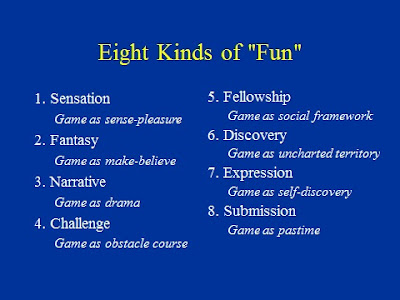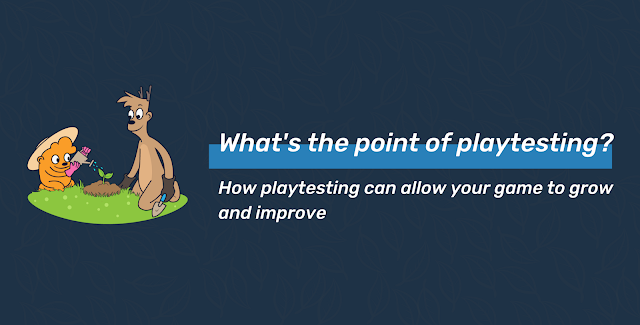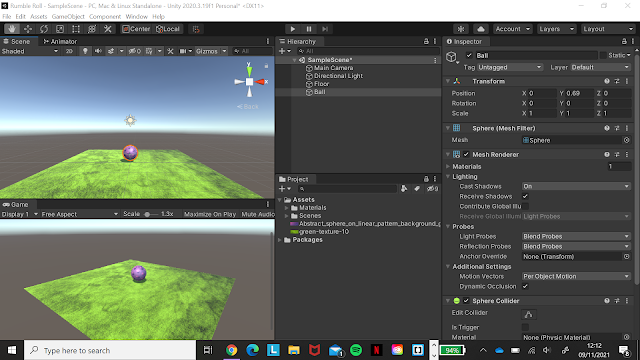Game Fun
Game Fun
The first reading of this week was "Gamification Design: What's fun got to do with it?" by Annie Velev. Fun has a lot of path ways and curves when it comes to game design. There can be so many types of "fun".
If we think of what is the meaning of fun off the top of our heads, we quickly think enjoyment of something, but when is comes to game design it goes down the path of pleasurable engagement. If a viewer doesn't like what they are playing it wont be "fun" for them of course. When a viewer likes a game and has the desire to keep playing, the designer knows they are having fun.
Source: 8Kindsoffun
After looking at this picture describing eight different kinds of "Fun" we can see there is many types of fun out there. It combines the players experience and their appeal towards that game in different measures to make it more "fun" for them.- Easy Fun can be described as exploring in a game or creating within a game.
- Hard Fun could be achievement from reaching a goal.
- People Fun can be described as getting amusement from competition or cooperation in a game.
- Serious Fun could be from excitement from changing the player and their world within the game.
Diagram by Nicola Lezzarzo's 4Keys to fun:
Source: xeodesign
In the next reading "Fun Factor" I have been intrigued by the points mentioned in this paper.
When playing any kind of game, you can get enjoyment and possibly frustration sometimes, but that is how the game flow usually pans out. If a player was to dive deep into their game, that will concentrate and try and get the objective, they may fail sometimes but could reach their goal after all them emotions. This will then bring them that 'good feeling' and achievement rank. This is a form of fun.
Some people can find their fun by simply playing on their own. emersed into their game. While others may prefer socializing with friends or online friends to get their fun. After carrying out a talk amongst a group of 17 participants, aged between 18-24 they discovered the gamers perspective of what do they find fun and frustration about gaming.
The results are as follows:
- Many found that playing with other was more enjoyable, sharing their experience a group.
- Playing with random people worked better for others, as it created a unknown territory so to speak.
- Frustration can be throwing the remote across the room due to friends giving you a harsh time.
- Playing with friends could frustrate you even more cause they won't go easy on you if you lose.
- Playing online with voice chat as the in-game communication source can get very nasty and create a negative space for some players, causing them to drift away from the game.
The groups discussed so many frustrations that they can experience and some may not be exactly in-game. A few spoke on the topic of family interfering while you are trying to game. The people physically beside you pestering you and trying to give you advice but making you annoyed.
After watching the YouTube video by The Game OverAnalyser speaks on the theory of fun. He speaks on Type one games, which would be games that get you thinking. Tic tac toe, chess, or poker. Type two based game are more along the lines of reflex based skills, how you react to a given situation, these would be using sharp reflexes or using your memory based skills.
"Fun is the feedback the brain gives us for absorbing patterns for learning purposes".
He discuses in the video about going back to the idea of 'flow theory' in games, when a player is met with a challenge, they use certain skills to overcome it. How do you overcome these types of situations? Type one or Type two, thinking and using reflex based skills depending on the situation the player is in.





Hello again Linda,
ReplyDeleteI must say that you are the first person that has credited the author of the article in your blog. You have done a terrific job at discussing the eight kinds of fun
It was very smart of you to do additional research by searching for and watching a YouTube video which will help your understanding of the topics
-Robbie Cahill